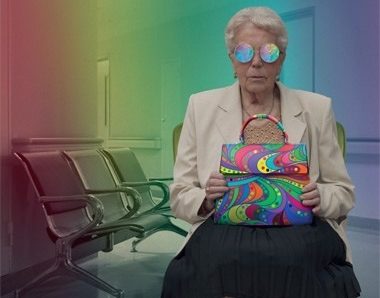‘Open-minded, immersive and fun’: a review of ‘All You need is LSD’
Leo Butler’s self-confessed desire to “take the audience on a trip” is the premise behind his latest play, All You Need is LSD. Based on his own experiences taking part in LSD trials with Professor David Nutt, the core of the performance is a rather self-indulgent re-enactment of his trip in a ‘play-within-a-play’ format, which features everything from Alice in Wonderland to Doctor Who. Butler also intersperses an informative and humorous rundown of the history of LSD, featuring now-iconic figures such as Albert Hoffman, Aldous Huxley, Timothy Leary, Steve Jobs and the Beatles. Partly polemical, partly comedic, the play ultimately seeks to explore the debate over recreational drugs and the puritanical policing of pleasure.
The 90-minute acid trip that Butler strives to give his audience is mostly successful. Set on a strangely futuristic white and silver structure that serves as the centrepiece of the stage, the play is colourful, fast-paced and jumpy. A four-person cast (Annie Fitzmaurice, Jack Hunter, Sophie Mercell and George Potts) means that characters are ever-changing as the narrative progresses from the discovery of LSD in Switzerland to Leonard/Leonora’s (Leonard decides on a gender reversal in the ‘play-within-a-play’ format) personal acid trip with Dr. Nutt, to the CIA experimentation with the drug during the Cold War. The changing characters and costumes, and indeed their changing accents, keep the audience on their toes as they seek to make sense of it all. Although confusing at times as dialogues overlap, scenes are repeated multiple times and the fourth wall is constantly broken, adding to very real sense that one is on a ‘trip’.
Butler provides an informative and humorous rundown of the history of LSD
As a history of LSD, the play is surprisingly educational whilst still being entertaining. Butler manages to include the key stages in the history of LSD – its accidental discovery in 1943, its role as an anti-communist weapon in the 1950s, its eventual evolution into a hippie consciousness-enhancing elixir by the 1960s – and all in episodic musical bursts combined with strobe lighting, which add to our ‘trip’. The caricature of historical figures are largely factually accurate: the raving High Priest of Psychedelics Timothy Leary, his no-nonsense adversary Ronald Reagan, and even the Beatles with their high ‘love and peace’ ramblings, all give the audience a point of familiarity and add to the lighthearted comedy of the play.
As a polemic which seeks to address the current nature of the regulation of recreational drugs, the play makes a pertinent argument. Between the back and forth between the history of LSD and Leonard’s own trip are compelling discussions about the use of LSD in a medicinal/therapeutic context (on his deathbed, we see Aldous Huxley administered with 100mg of LSD to ease him away) and the contradictory nature of a drug policy which illegalises LSD but turns a blind eye to the harmful effects of alcohol. Speaking directly into the microphone and addressing the audience at the beginning of the play, Leonard explicitly calls attention to this and makes his view clear. A somewhat sombre scene later on also forces us to consider the innocence of childhood where one has no such need for drugs, as Leonard, sitting at the end of his sleeping daughter’s bed, softly voices that she has “everything all worked out”. It is only with the complexities and difficulties of adult life, it seems, that the escapism of drugs becomes most attractive. Although this discussion is sometimes lost in the joviality of the rest of the play, the ending once again gives the audience a sobering reminder of the work’s overarching purpose: a chart ranking the harm caused by different drugs to both individuals and society is brought out. Topping the chart is alcohol.
The play is surprisingly educational whilst still being entertaining
Overall, whilst the play fails to achieve the quality of comedy that it promises and, indeed, that one might expect from such a subject matter, there are nevertheless a few laugh-out-loud moments that do deliver (acid tabs in the bathroom cabinet, anyone?). Overlooking the sometimes farcical accents, the cast’s ability to quickly inhabit different characters without losing either the audience or the energy and movement of the play is admirable. For an open-minded, immersive and fun insight into the history of LSD, All You Need is LSD is well worth watching.

Comments
Comments are closed here.